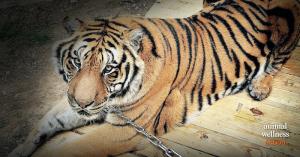Today, U.S. Senators Susan Collins, R-Maine, Richard Blumenthal, D-Conn., Tom Carper, D-Del., and Richard Burr, R-N.C., introduced the Big Cat Public Safety Act
The trade in big cats produces a raft of homeless big cats that animal welfare groups take in at enormous expense, it puts law enforcement at risk, and creates pain and misery for the animals.”
WASHINGTON, DC, UNITED STATES, April 19, 2021 /EINPresswire.com/ -- Today, U.S. Senators Susan Collins, R-Maine, Richard Blumenthal, D-Conn., Tom Carper, D-Del., and Richard Burr, R-N.C., introduced the Big Cat Public Safety Act. The House bill, H.R. 263, introduced in January, has 164 cosponsors, and the same measure cleared the House by an overwhelming margin last year. The group expressed optimism that the Senate, for the first time, would take up the legislation to prohibit the private ownership of lions and tigers and make it illegal for exhibitors to allow public contact with cubs in an enterprise known as ?cub petting.? — Wayne Pacelle
?The trade in big cats produces a raft of homeless big cats that animal welfare groups take in at enormous expense, it puts law enforcement at risk when they respond to crises, and, without fail, it creates pain and misery for the animals,? said Wayne Pacelle, president of Animal Wellness Action and the Center for a Humane Economy. ?We?ve been working hard to build bipartisan support for this legislation, and that?s exactly what we?ve got with the House and Senate bills.?
?Big cats like lions, tigers, and cheetahs belong in their natural habitats, not in the hands of private owners where they are too often subject to cruelty or improper care,? said U.S. Senator Susan Collins (R-ME). ?Our bipartisan bill would prohibit the private ownership of big cats, which threatens the safety of the animals and the public and harms conservation efforts. I have long advocated for policies that improve the welfare of animals, and I urge my colleagues to join me in supporting this legislation.?
Not only are the trade in big cats and practices costly unfunded mandates for rescues, and dangerous potential hazards for humans, but these innocent creatures live miserable lives. The cubs are taken from their mothers at birth, deprived of the proper nutrition found only in mothers? milk, denied sleep while being handled for hours on end, and physically punished for exhibiting their natural behaviors.
Cub petting as a business strategy lasts just a few months for each animal. They become too big to handle after that, and that?s why the operators must keep breeding tigers and lions to keep a fresh supply in the pipeline. Each captive tiger or lion brought into that world costs animal sanctuaries like Florida?s Big Cat Rescue as much as a million dollars over the course of the animal?s lifespan.
There?s also great danger in the potential release or escape of big cats, as we saw in its most dramatic form in the 2011 Zanesville, Ohio case where a mentally troubled exotic animal owner released 50 exotic animals, including grizzly bears, wolves, and big cats, into the community just before dusk. Sheriffs? deputies were ordered to shoot the animals for public safety purposes, creating a tragedy for all involved.
The legislation is endorsed by Animal Wellness Action, the Animal Wellness Foundation, Center for a Humane Economy, SPCA International, Big Cat Rescue, Association of Zoos & Aquariums, National Sheriffs? Association, Fraternal Order of Police, World Wildlife Fund, Endangered Species Coalition, and Natural Resources Defense Council.
Animal Wellness Action (Action) is a Washington, D.C.-based 501(c)(4) organization with a mission of helping animals by promoting legal standards forbidding cruelty. We champion causes that alleviate the suffering of companion animals, farm animals, and wildlife. We advocate for policies to stop dogfighting and cockfighting and other forms of malicious cruelty and to confront factory farming and other systemic forms of animal exploitation. To prevent cruelty, we promote enacting good public policies and we work to enforce those policies. To enact good laws, we must elect good lawmakers, and that?s why we remind voters which candidates care about our issues and which ones don?t. We believe helping animals helps us all.
The Animal Wellness Foundation (Foundation) is a Los Angeles-based private charitable organization with a mission of helping animals by making veterinary care available to everyone with a pet, regardless of economic ability. We organize rescue efforts and medical services for dogs and cats in need and help homeless pets find a loving caregiver. We are advocates for getting veterinarians to the front lines of the animal welfare movement; promoting responsible pet ownership; and vaccinating animals against infectious diseases such as distemper. We also support policies that prevent animal cruelty and that alleviate suffering. We believe helping animals helps us all.
The Center for a Humane Economy (?the Center?) is a non-profit organization that focuses on influencing the conduct of corporations to forge a humane economic order. The first organization of its kind in the animal protection movement, the Center encourages businesses to honor their social responsibilities in a culture where consumers, investors, and other key stakeholders abhor cruelty and the degradation of the environment and embrace innovation as a means of eliminating both.
Marty Irby
Animal Wellness Action
+17024199410 ext.
email us here
Visit us on social media:
Facebook
Twitter


